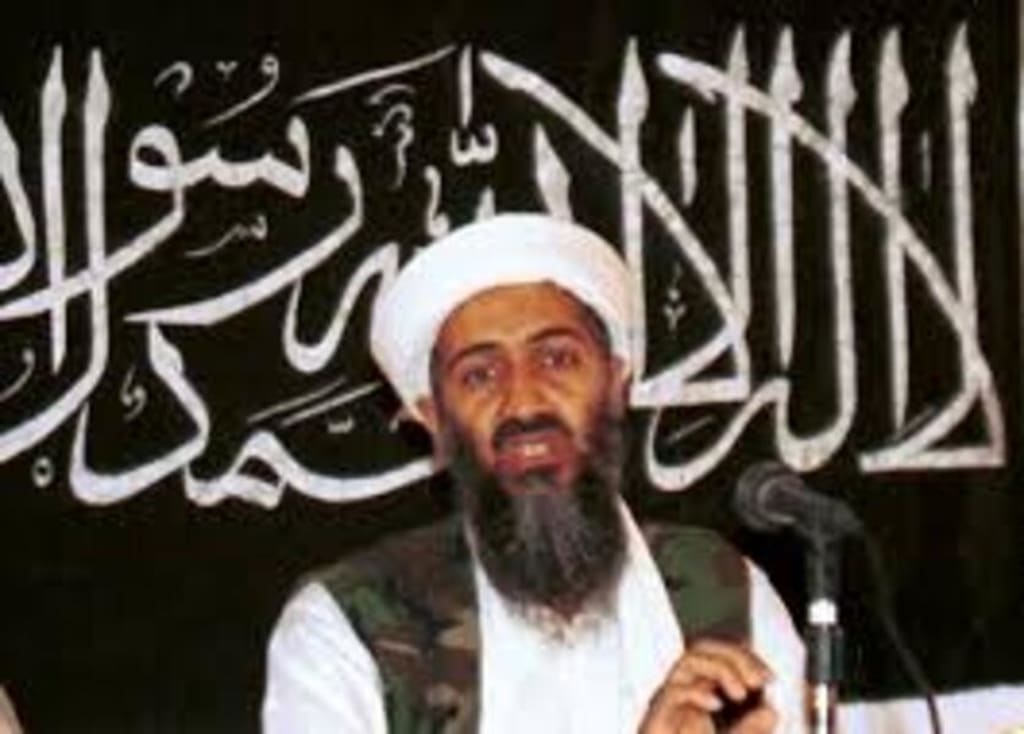Why Did Osama Bin Landen Attack The U.S
Ironically, Osama Bin Laden's desire to wage war against America may have stemmed from his homeland's decision to invite U.S. troops to safeguard them against a hostile neighbor.

Osama Bin Laden etched his name in the annals of history due to his relentless fixation on targeting the United States and its allies. This relentless pursuit of his mad agenda ultimately culminated in his demise at the hands of Seal Team 6 in 2011.
Yet, the question looms: what fueled this terrorist mastermind's obsession with the United States, and why did he initiate attacks against the U.S. in the first place? Contrary to the prevailing notion that many terrorists are driven by desperation in the face of perceived oppression, this narrative does not squarely apply to Osama Bin Laden.
Born into opulence as the son of Mohammed bin Awad bin Laden, a billionaire construction magnate, Osama enjoyed a life of affluence. Mohammed bin Laden's immense wealth ensured the well-being of his sprawling family, which included a total of 52 children from various marriages. Although Osama's mother divorced the billionaire shortly after his birth, he would eventually inherit a substantial sum, roughly estimated at $25 million, from his father's estate.
Osama's early life was marked by his family's devout adherence to mainstream Sunni Islam. They were well-integrated into Saudi Arabian society, and the notion of one of their own becoming an infamous terrorist seemed inconceivable. His academic pursuits in the 1970s, characterized by a mild-mannered demeanor, led him to King Abdulaziz University in Jeddah, where he initially pursued studies in economics and business. While the specifics of his major remain unclear, it is known that he briefly attended a class at Oxford University. Those who crossed paths with him during this time described him as passionate about poetry, military history, and soccer.
So, how did this trajectory veer so profoundly off-course? The turning point occurred when he left college in 1979 and journeyed to Afghanistan to participate in the resistance against the Soviet Union. While the Soviet invasion of Afghanistan ignited his transformation into a political radical, his animosity toward the United States had not yet materialized. In fact, during this period, the United States and the Soviet Union were entrenched as bitter adversaries. Groups like the Mujaheddin, with which Bin Laden associated, received financial support from the United States in their battle against the Soviets. Saudi Arabia also supported this resistance. At the time, it appeared that Bin Laden's interests aligned with those of Western nations.
However, something shifted dramatically.
As Osama Bin Laden gained notoriety in the Western world due to escalating terror attacks against U.S. interests, his motivations underwent a profound transformation. This transformation also affected his global standing, leading to the revocation of his Saudi citizenship. The Saudi government, highly valuing its alliance with the United States, particularly given its rivalry with Iran, sought to distance itself from this unpredictable element. Consequently, Bin Laden found himself a stateless terrorist, seeking refuge in countries such as Sudan, Pakistan, and Afghanistan. He would intermittently resurface to deliver threatening videotapes, shedding light on his evolving motivations.
Bin Laden articulated various explanations for his actions, not all of which aligned cohesively. Shortly after the 9/11 attacks, in his first videotape claiming responsibility for them, he pointed to the Israeli-Palestinian conflict as a central reason. This conflict, raging for over five decades, had two conflicting narratives: one portrayed Israelis as defenders of a fledgling nation, while the other depicted Palestinians and neighboring Arab states as victims expelled from their ancestral lands. Yet, it seemed unusual for Bin Laden to emphasize this issue, as he had never previously mentioned it. It's plausible that, following his most significant strike against the U.S. and his emergence as public enemy number one, he invoked this contentious topic in a bid to garner more support from regional countries.
However, other conflicts may have played a more substantial role in his radicalization. The Gulf War of the 1990s, which saw the United States thwart Saddam Hussein's invasion of Kuwait while allowing him to remain in power, left an indelible mark on Bin Laden. Saddam's brutal treatment of minority groups like the Kurds and his confrontations with U.S. aircraft in his airspace prompted the United Nations to impose sanctions on Iraq. These sanctions, which led to a trade embargo and widespread suffering in Iraq, deeply angered Bin Laden. He cited them in his 1998 fatwa against Americans, justifying attacks on civilians due to the devastation they caused. Yet, Bin Laden had no direct ties to Iraq, and Saddam's secular regime diverged significantly from Bin Laden's radical ideology.
Bin Laden's manifesto also referenced numerous Muslim conflicts worldwide, including Russia's oppression of Chechen Muslims, the Kashmir border dispute between Hindu India and Muslim Pakistan, the Philippine government's clashes with Muslim groups, and Israel's ongoing conflict with Lebanon along its northern border. In each case, Bin Laden asserted that the United States supported these groups in oppressing Muslims. However, the U.S. had minimal involvement in most of these conflicts, and Bin Laden's inclusion of them appeared more as a list of grievances than compelling evidence.
One grievance deviated from the rest and may have resonated with some right-wing Americans. In his 2002 "Letter to America," Bin Laden expanded his grievances to encompass America's domestic conduct. Rather than accusing the U.S. of oppressing Muslim Americans, he castigated American society for perceived immorality, including support for promiscuous sex, gay rights, alcohol and drug use, gambling, and interest-based banking. This sudden shift toward cultural criticism, while not uncommon among anti-American radicals, appeared to emerge as a new grievance following his rise to infamy. It is unlikely that this was his primary motivation for the attacks, but Bin Laden, a skilled propagandist, may have included it in his manifesto to sow division among Americans.
Nonetheless, most experts concur that one factor outweighed the others in motivating him. In 1991, Saddam Hussein's invasion of Kuwait, a petroleum-rich Gulf state, played a crucial role. Despite their divergent ideologies, the roots of Bin Laden's anger may be traced back to this war. The United States and Saudi Arabia formed a close alliance, leading to the deployment of U.S. troops on Saudi soil for operations against Iraq. While this arrangement served the security interests of both nations, Osama bin Laden perceived the presence of U.S. troops on holy Muslim land as an invasion. Even though these troops were not stationed near the sacred cities of Mecca and Medina, they were too close for Bin Laden's radical viewpoint.
Evidence suggests that this may have been the trigger that transformed him into an anti-American militant. His first fatwa in 1996 explicitly demanded the U.S. evacuation from Saudi Arabia. Two years later, he referred to it as an invasion, accusing the U.S. of exploiting and humiliating the Saudi people. He believed that the U.S. presence was a precursor to an assault on the entire Muslim world, repeatedly emphasizing the proximity to Mecca. While the U.S. presence in Saudi Arabia eventually ended with the onset of the second Iraq war due to Saudi opposition, this motive remained consistent in Bin Laden's rhetoric.
Ironically, Osama Bin Laden's desire to wage war against America may have stemmed from his homeland's decision to invite U.S. troops to safeguard them against a hostile neighbor. Consequently, when inquiring about the source of his animosity toward the United States, one may receive a myriad of responses, with most reflecting personal opinions more than an absolute truth.
About the Creator
Francis Osei
“Tom bele has been working with writing challenged clients for over four years. He provides ghost writing, coaching and ghost editing services.






Comments (1)
Great work! Good job!